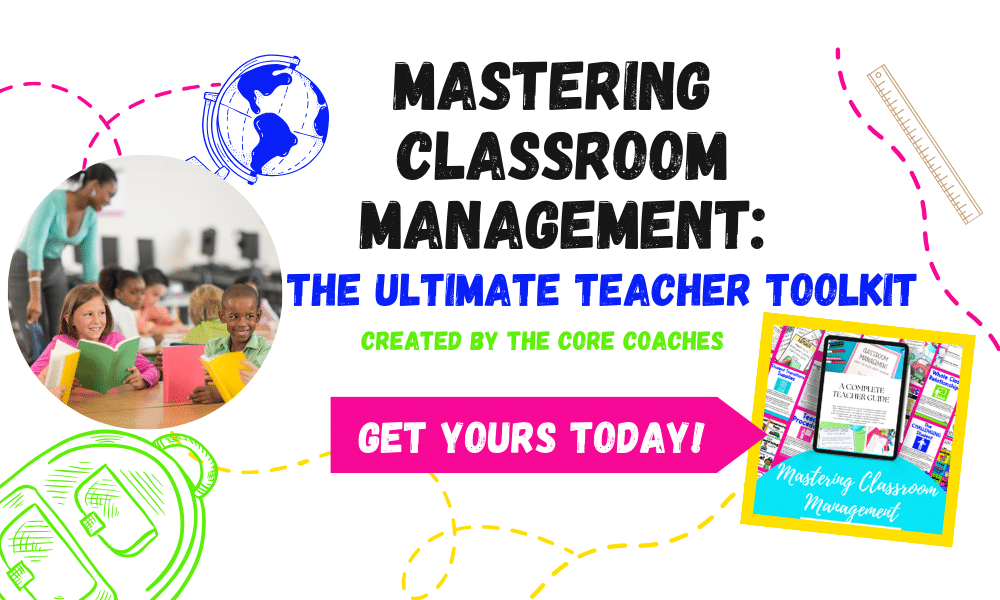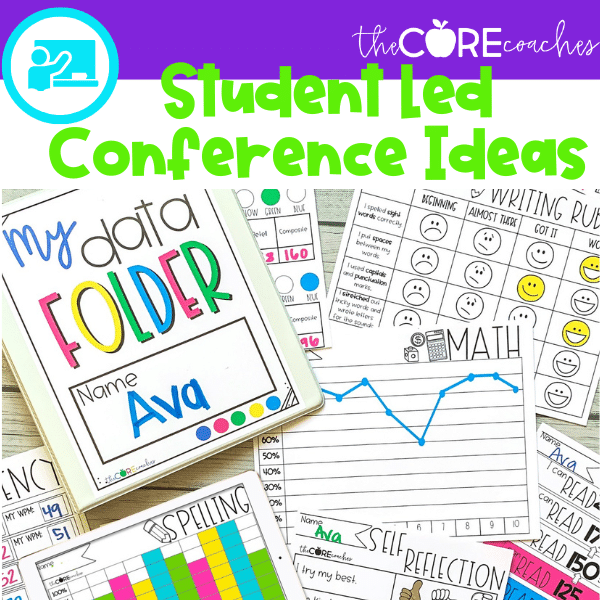First, let us say WELCOME to the club! We are so excited to have a new educator joining the ranks. Let us also say, we understand all the emotions you may be feeling!
Being a new teacher can be both an exhilarating and daunting experience. The excitement of molding young minds and making a positive impact on students’ lives can quickly be overshadowed by the challenges that come with managing a classroom and delivering effective lessons.
However, with the right strategies and support, new teachers can overcome these hurdles and thrive in their roles as educators. To help you thrive during your first year, we used our expertise and experience in the classroom to come up with 10 essential teacher tips you can use to succeed as a new teacher.
1. Embrace Growth
During your student teaching, you may have come across lesson plans on a growth mindset. This topic has become one of the most popular (and important) skills taught in schools over the last several years and with good reason.
Teaching students how to have a growth mindset is an excellent way to begin the school year. It creates an environment of learning where all students can feel successful. This is why it is one of our favorite back to school lesson plans.
A growth mindset is not just for students though! It is also an important way of thinking for teachers to embrace, especially new teachers.
Teaching is truly a learning process and just like any new career, there are challenges you will face. Embracing a growth mindset will help you better navigate the teaching journey as you encounter both successes and setbacks along the way. Therefore, helping you to see the challenges as opportunities to grow and develop as an educator.
2. Find a Mentor teacher
Guidance from an experienced teacher can be incredibly valuable for new educators. Therefore, most schools provide new teachers with a more experienced colleague to act as a mentor for new teachers.
These mentor teachers can help guide you through not only how to approach teaching, but the culture of your new school. From how to make copies to how to deal with a difficult student, these experienced teachers are often a great wealth of knowledge.
While assigned mentors are often wonderful support, you can also seek out additional guidance. In addition to the mentor teacher, consider asking another experienced teacher at your school to share their favorite teacher tip with you. You may even seek out a teacher who has a similar teaching style as you.
These other experienced teachers may be able to provide valuable insights on how to make a lesson plan more effective or share ideas on how to manage classroom behavior. These fellow teacher friends can also offer emotional support when you need to talk through a difficult day.
3. Create a supportive network
Beyond your immediate surroundings, you can also find support in other areas. Professional development workshops are a great place to start. While your school will offer professional development throughout the year, don’t be afraid to seek our additional training on your own.
There are several workshops and online courses available in all areas of education. In addition to workshops, you can find a lot of helpful information by reading teaching blogs (like here at The Core Coaches!).
Workshops, courses, blogs, Facebook groups, and even YouTube are all excellent ways to learn from and connect with expert educators beyond the walls of your school. These resources provide insight and ideas into teaching that you may not have access to within your immediate community. Moreover, they show you that you are not alone!
If you’d like free tips on classroom management support, we invite you to sign up here!
4. Develop Effective Classroom management techniques
If there was one teaching tip we could give you for a successful year it is to prioritize classroom management. Effective classroom management is truly the backbone of successful teaching (and student learning). Moreover, it is the key to helping you maintain your desire to teach!
There are several components to effective classroom management. During student teaching you may have been advised to focus your classroom management around classroom rules.
While classroom rules are important they are not the most important part of a well-managed classroom. We would argue that the most important element of any classroom management strategy is building relationships with your students.
Focusing on positive relationships helps create a positive classroom environment. This helps students to feel welcome, safe, and ready to learn. Therefore, we recommend starting to build positive relationships and a classroom community on day one of the new school year.
In addition to building positive relationships and creating a classroom community, there are four other essential elements of effective classroom management.
- Routines and Procedures
- Student Engagement
- Student Accountability and Leadership
- Time Management
We dive deeper into all six of these areas of classroom management in our online course:
Classroom Management Course: When the Rules Don’t Work
This online course is designed to support new teachers (and even veteran teachers) in building an effective classroom management system that goes beyond just the rules.
Beyond the strategies we provide throughout the course, we also provide you with dozens of teaching resources to use in your classroom. These resources make it easy to implement the strategies we share without adding more to your plate.
- Module 1: Establishing Positive Relationships
- Module 2: Creating a Positive Classroom Environment
- Module 3: Making Routines and Procedures Effective
- Module 4: Student Engagement
- Module 5: Student Accountability and Leadership
- Module 6: Time Management
New Teacher Classroom Management Strategies
Our Classroom Management course is the best value for a new teacher because it includes instructional videos PLUS dozens of classroom resources (including some resources that are exclusive to the course).
However, you can also grab several of our classroom management resources on their own without the support of the course.
5. Set clear classroom expectations
Establishing clear expectations for students is vital for maintaining a well-managed classroom. Not only does it help with classroom behavior but also with student learning.
Some effective teaching practices that can be used to deliver clear expectations are daily classroom routines and procedures for things like transitions from one activity to another. In addition, rubrics help support student learning by showing them the desired outcomes.
Regardless of what strategy you use, it is essential to clearly communicate the expectations to your students. For example, having students practice the routine several times rather than just explaining it to them or reviewing the rubric before they begin the assignment.
By showing students the expected outcomes, they can meet your expectations more easily. This helps them to participate fully and to be successful in their learning.
6. Incorporate Social Emotional Learning
While your initial job as a teacher is to provide an academic education you will quickly learn that there is more to learning than academics. Specifically, creating a safe classroom that supports social and emotional learning.
Many of our students’ lives outside of the classroom can greatly impact their learning. From preschool to middle school and high school, kids may be dealing with things at home that create stress, anxiety, and depression.
These outside events can all impact a student’s ability to learn. Therefore, it is important to incorporate opportunities for kids to learn how to manage their emotions. By learning to manage their emotions in a healthy way they can then free up space in their minds to focus on learning.
Thankfully, there are several ways to help students manage these different emotions so they can continue to strive in their academics. Teaching students how to meditate or use mindfulness tools like breathing exercises are all great places to begin.
These types of mindfulness activities are easy to implement in the classroom. In addition, something as simple (and fun) as a brain break can also help young kids learn to pause and reset throughout the day.
7. Prioritize Self Care
It is no secret that teaching can be emotionally and physically demanding, but what often gets ignored is giving teachers permission to take a break from these demands. So, let us be the first to say that not only is it okay, but it is essential, that you make time for self-care.
In order to be a successful (and happy) teacher you need to prioritize YOU! Yes, your job is to show up for the students each day. However, in order to do that you must also show up for yourself each day.
Every teacher has a different way to enjoy self-care but here are a few ideas. Prioritize your well-being by setting aside time for activities you enjoy outside of the classroom. Hobbies, travel, exercise, and spending time with loved ones are all wonderful ways to recharge and prevent burnout.
8. Reflect and Adapt
As we mentioned earlier, teaching is a process. Therefore, taking time to reflect on how things are going in the classroom is one of the best things you can do to continue to grow.
There will be times when you deliver a lesson that is absolutely amazing! On the other hand, there will be times when a lesson just bombs. In addition, there will be times when students love an activity and other days when there is zero engagement with an activity.
All of these experiences are opportunities for you to question what went well and where you can improve. By regularly reflecting on your teaching practices and being open to making adjustments, you will not only become a more effective teacher but will enjoy teaching more.
Reflection can be done on your own by using a reflection sheet or by inviting feedback from others. Even though it can be difficult, one great way to reflect is to embrace constructive feedback from school administrators. You can also seek out feedback from a colleague who is a more experienced teacher & that you trust to provide you with helpful feedback.
9. Leave Work at Work
Teaching is your job – it is not your life. Read that again, Teaching is your job – it is not your life.
We emphasize this because one of the biggest challenges in teaching is finding enough time to get everything done at school. Therefore, it may seem tempting or necessary to take work home.
You may see other new teachers (or even a veteran teacher) taking work home and think you have to follow suit. You don’t.
Yes, it may take some time to find the right rhythm at school to get things done during your contract time or to determine how long after school you may need to stay to wrap things up. However, the more you can set a boundary to not stay too late and to not take work home – the happier you will be as a teacher and in life.
If you need support on this, we cover this topic in more detail in our Classroom Management Course and provide you with strategies and resources to help you manage your time at school.
10. Celebrate Small Victories
In the fast-paced world of education, it’s easy to get caught up in the challenges and overlook the successes. So, don’t forget to celebrate even the smallest victories!
Pay attention to little improvements in student work or a student’s improved test score. Celebrate a well-executed classroom activity or a positive parent-teacher interaction.
Embarking on a teaching career as a new teacher may seem intimidating, but with the right strategies, support, and mindset, it can also be an immensely rewarding experience. Recognizing these small moments is one way to remind you why you became a teacher in the first place.
Bonus Teaching Tips and Resources
As you prepare to step into your first year of teaching we are here to celebrate you and help you! In addition to each teacher tip we have provided above, you can find several more resources here on The Core Coaches website. We hope you will lean on us for support by viewing related articles in the blog and our catalog of ready to teach lesson plans and activities.






